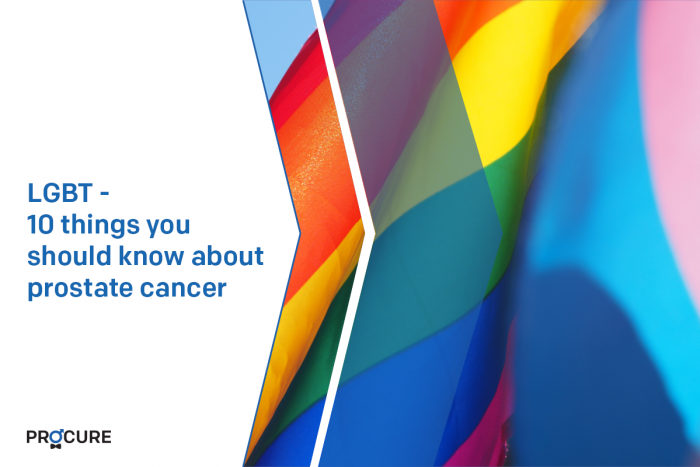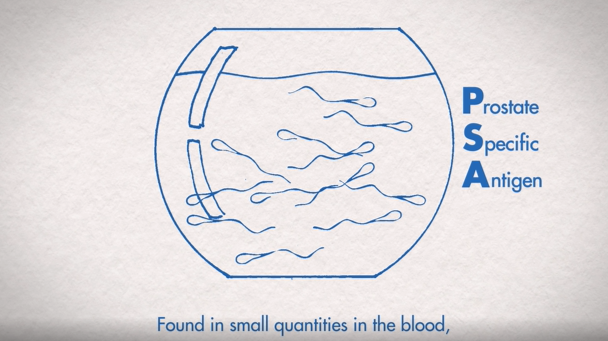In Quebec, 12 men are diagnosed with prostate cancer every day, regardless of their sexual orientation. For the LGBT community, here are 10 things you need to know about prostate cancer. And know that our team of nurses specialized in uro-oncology is there to answer all your concerns, as well.
10 things to know about prostate cancer
The LGBT community needs to know – Ladies and gentlemen, whether gay, bisexual, transgender or other genders, you have the same risk as straight men for developing prostate cancer. If you’re interested in this topic, make sure you have the right information or surf credible and up-to-date sites like ours. The old news from 5 years ago, implying that you were more at risk, is no longer relevant and should be tossed out.
Your risk factors – The most important risks over which you have no control are your age, your family history of cancer and your racial origin, black men being more at risk. The risk is the same for anyone with a prostate. Do you have one? If, when you were born, everyone cried out, it’s a boy, you still have this sex gland, no matter what type of surgeries you underwent to change sex.
Your lovemaking or sexual practices have nothing to do – Neither oral or anal sex, spiced up or not with toys, increases your risk of developing prostate cancer. In other words, a sexually stimulated prostate does not induce prostate cancer. In addition, the scientific community agrees that ejaculations could have a protective effect against prostate cancer. So, have fun… while practicing safe sex.
You are more affected physically and psychologically – Studies have shown that gay or bisexual men are more negatively affected by the side effects of prostate cancer treatments than heterosexual men. The impact of erectile dysfunction, loss of ejaculate or libido on your intimacy is particularly profound, as your sexuality is intimately linked to your identity.
Know that we do not really need studies to know this. Your testimonies… testify to your reality. A straight man who lives with a menopaused partner who copes with his erectile dysfunction or loss of libido is by far the opposite of your situation. So, talk to your partner, talk to someone you trust, talk to your doctor, and consult a sex therapist without hesitation!
You are single? You will have no choice but to talk about it too. But we suggest you read this blog article before. Basically, this is an article for everyone hoping to find love. The message here is open up and say what you are concerned about to get all the support you need.
You were a man before changing sex? – Transgender women, or trans women, have a prostate gland and can, therefore, develop prostate cancer, whether you have undergone surgery to change sex. In fact, your prostate is usually spared during such an intervention, because its removal is complex and can lead to complications, including urinary incontinence.
More research is also needed to determine your level of risk as a trans woman and the effects of feminine hormone therapy on your risk of developing prostate cancer or having more aggressive cancer when diagnosed. We know all of this is not straightforward, but still refer to the above-mentioned risk factors and talk to your doctor. If the latter makes you uncomfortable or seems closed, change for a doctor who is more open. You can also call us. We are here for you at 1 855 899-2873!
Emotions, questions, and loss of your bearings – Predominantly male cancer can be emotionally difficult for transgender women and non-gendered people. In addition, for gay or bisexual men, the distress associated with side effects, loss of self-esteem and the feeling of being only the shadow of his person are real. Remember, you can call on your doctor, sexologists, social workers, and our team to support you and help you overcome these feelings. You can call us as well.
Prostate cancer is curable – If diagnosed at an early stage, almost 100% of all people with prostate cancer will be alive five years after diagnosis. In fact, it is curable if there is no spread elsewhere in the body and well confined to the prostate. Hence the importance of thinking about screening if you are 50 or older with no risk factors and 45 years old if there is cancer in your family or if you are a black man. And know that the fitter you are, the more sexually active you are and the sooner your cancer is detected, thus confined to your prostate, the more you will return to a certain normal life post-treatment. Are you one of those who have risk factors? If so, talk to your doctor. Don’t you have a family doctor? Find one. It is a must!
Knowledge is Power – If you or someone you love is diagnosed with prostate cancer, learn all you can about the results that led to that diagnosis and the disease. This will facilitate your decision about treatment. It is important to have a doctor with whom you can talk openly about your sexual orientation or gender identity. Since prostate cancer can affect gay or bisexual men and transgender women differently from heterosexual men, talking about it openly with your doctor can help you get the best treatment possible.
Open the communication valves – This will allow you to discuss your concerns or fears with your partner, otherwise with your doctor if you are single. When talking about cancer, you have to open these communication valves, because just the word cancer is scary. If it’s been a long time since you’ve never talked in depth about a subject, while you have prostate cancer or living with treatment side effects, you will have to open these valves and the use of a little humor can help go a long way. For example, Darling, he, my friend below, needs to talk to you… or Doctor, I have a date tonight, how to wake him up without suspicion…!
As Chris Hartley said – Am I less of a man now that I am a prostate cancer survivor? At the beginning of my life, I had to accept the fact that I was not less a man because I was gay. Prostate cancer made me question my manhood, but in a different way. This time as father and husband. I am a better man now, with a different perspective on this disease and my sexuality. My advice is, whether you are straight, gay, bi, whatever, keep an open mind and be patient. Sex may not be the same thing, but that doesn’t mean it can’t be as if not more satisfying than before (you can read the full article here).
Discover our new animated videos
Discover three new animated videos, each equally unique and original from one to the other. Be on the lookout!
Here is the first one – Symptoms, Risk and Screening
Take the time to visit each of our pages on this website, as well as our YouTube channel, in order to get familiar with the disease with our expert lectures, our section on available resources, the support that is offered to you.
Do you have any questions or concerns? Above all, do not hesitate. Contact us at 1 855 899-2873 to discuss with a nurse specializing in uro-oncology. It’s simple and free, like all our services.
Pages of our site that might interest you
Want to know more? Just click on one of the links below.
Nutrition and Healthy Body
Resources
The latest PROCURE news that might interest you
Every week we publish a blog article. Here are some we chose for you.
Penis pump | Should I get one?
Erectile dysfunction: frustrating, but treatable!
Sex and intimacy: Discussing it openly is good for your health!
Sources et references
Gay and bisexual men
The LGBT Community and Prostate Cancer
Written by PROCURE. © All rights reserved – 2020



 ADDITIONAL RESOURCES
ADDITIONAL RESOURCES


